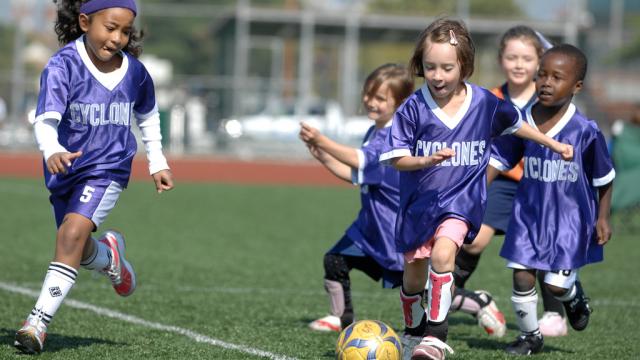It happens with parents all the time. They sign little Everett up for kids’ soccer and he’s good. Really good. So they put him in soccer camps, goalkeeper clinics and spend every weekend lugging coolers and lawn chairs to his soccer games all over the state. They start daydreaming about professional contracts and how he might even become the next Mark Schwarzer. Good thing they discovered his perfect sport so young, right?
Photo: USAG- Humphreys/Flickr
[referenced url=”https://www.lifehacker.com.au/2014/02/signs-you-might-be-a-nightmare-sports-parent-and-how-to-act-instead/” thumb=”https://img.gawkerassets.com/img/19fomej0p86cppng/original.png” title=”Signs You Might Be A Nightmare Sports Parent (And How To Act Instead)” excerpt=”We all know the stereotypical overbearing mums and dads at games. The kinds who scream at the refs, belittle the coaches and embarrass their children. There’s another, less obvious kind of nightmare sports parent though. well-intentioned mums and dads who unwittingly ruin a sport for their kids.”]
Maybe not. According to new research published in the Orthopaedic Journal of Sports Medicine, specialising in a sport at a young age does not seem to be related to future success in that sport at an elite level and can even be harmful, leading to more injuries.
Those required 10,000 hours of practice don’t apply to most sports, except for the ones where athletes compete at the Olympic level young, like rhythmic gymnastics and figure skating. For kids, it’s better to try different sports and activities, or just run around and play whatever comes to mind. (Remember when all the neighbourhood children just knocked on each other’s doors and gathered to play tag in the field? Me neither, but let’s bring that back.)
Here’s why.
Overtraining Can Lead to More Injuries
Repeating the same movements over and over, like pitching a baseball, can put stress on the ligaments, muscles, tendons and growth plates. Kids’ bodies are not the same as adult bodies and those who specialise in a sport have the additional risk of sustaining overuse injuries, according to the data.
For example, in a study of 546 teenage female athletes who played basketball, soccer or volleyball, there was an increased rate of anterior knee pain in those who had specialised in the individual sports at an early age than those who played a variety of sports.
[referenced url=”https://www.lifehacker.com.au/2015/05/take-an-occasional-break-from-the-gym-to-keep-up-your-progress/” thumb=”https://i.kinja-img.com/gawker-media/image/upload/t_ku-large/1259059203990030733.jpg” title=”Take An Occasional Break From The Gym To Keep Up Your Progress” excerpt=”No matter how lofty your fitness goals are or how little time you have, you still need rest. Constantly hammering yourself into the ground is (unsurprisingly) unsustainable, and can actually undo your progress. Here’s why.”]
Specialisation Can Lead to Burnout
The pressure for kids to be “committed” to one sport is causing emotional burnout. That leads to them quitting the sport, and once they quit, they rarely return. About 70 per cent of children drop out of organised sports by age 13. It’s too much pressure.
The Best Athletes Played a Variety of Sports When They Were Young
In the study, which surveyed 3039 athletes at the high school level and beyond, only 22 per cent of professional athletes said they would want their own child to specialise in one sport during childhood and adolescence. Most pro athletes played two or more sports at a young age, especially high school — check out the massive Wikipedia list.
Participating in multiple sports builds up different muscles and can help players become better all-around athletes. Several college football coaches in the US even say they seek out multi-sport athletes on the recruiting trail.
The American Academy of Paediatrics warns against single-sport specialisation and instead recommend that parents:
- Delay sports specialisation until at least age 15 or 16.
- Encourage their kids to participate in multiple sports.
- Discuss sports goals with their paediatrician to see if they are appropriate and realistic.
- Take time off from the sport if they do decide to specialise. They should take a break from their sport at least three months during the year, in increments of one month. They can still be active in other ways, of course.
- Take one to two days off from their sport per week to decrease chances of injury.

Comments
2 responses to “Why Kids Shouldn’t Specialise In One Sport Too Early ”
Growing up I was a nerdy kid, but I did pretty much every sport available, auskick, soccer, hockey, little athletics and rugby league. At 12 I dropped all of them and started playing union exclusively because it was the only one that didn’t clash with air cadets and scouts. Stopped at 17 after a car crash but looking into doing union as an adult in a local team.
Lotta sports is good fun for all kids even academic kids and I’d recommend parents at least get their kids to try each one for a season each.
Hated sports as a child. It was never about “having fun” or even “fit & healthy” – everything was about selecting the best athletes for school sporting events.
If you didn’t make the grade, the lack of attention / interest in your performance was hard to miss. Which destroyed interest in the sport, in a loop of negative reinforcement.